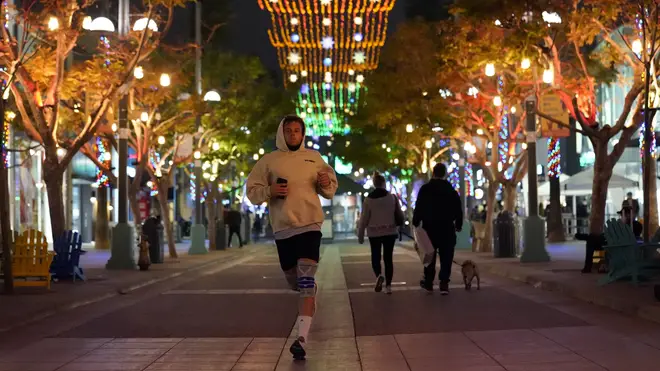
Tom Swarbrick 4pm - 6pm
20 November 2020, 06:04

People who are not on essential errands will be required to stay home from 10pm to 5am.
California is imposing an overnight curfew for nearly all residents as the state tries to head off a surge of coronavirus cases that threatens to overwhelm its health care system.
What officials are calling a limited stay-at-home order requires people who are not on essential errands to stay home from 10pm to 5am starting on Saturday.
The order will last until December 21 but could be extended if disease trends do not improve.
The curfew covers 94% of the state’s nearly 40 million residents.
It is in place in 41 of the state’s 58 counties that have the most significant increases in virus cases and face the most severe restrictions under California’s four-tier system for reopening the economy.
It is a swift escalation that comes just three days after the state imposed tougher restrictions limiting business operations in those 41 counties.
Covid-19 infections, hospitalisations and deaths are surging nationwide ahead of Thanksgiving, when many will be tempted to gather with family and friends.
“The virus is spreading at a pace we haven’t seen since the start of this pandemic, and the next several days and weeks will be critical to stop the surge. We are sounding the alarm,” California governor Gavin Newsom said in a statement.
Hospitalisations are up nearly 64% in two weeks and the positivity rate — the percentage of people testing positive for the virus — has increased more than 50% and now stands at 5.6% for the last seven days.
The state recorded 11,478 cases on Thursday, its highest total since mid-August.
The state’s top health officer, Dr Mark Ghaly, said throughout the pandemic about 12% of positive cases end up requiring hospitalisations.
That means based on just the one-day total about 1,200 people will be in hospitals in the next two to three weeks.
The new health order does not close any businesses. However, nonessential businesses must shut their doors by 10pm, though restaurants will be permitted to offer takeout and delivery after that time.

People can still shop for groceries, get medical care, pick up prescriptions and take care of other essential needs during the curfew hours.
Several Republican state lawmakers quickly questioned the move, while sheriffs in counties including El Dorado, Orange and Sacramento were quick to say they would not enforce the curfew.
Curt Hagman, chairman of the San Bernardino County Board of Supervisors, said he understands the need for the state to drive home the message that residents must keep their guard up against the virus, but he does not see a curfew as the way to do it.
“We’re not going to be sitting out arresting people if they’re out at 10:30 at night. We don’t have the resources,” he said.
California was the first state to impose a stay-at-home order in March, and Dr Ghaly said health officials have learned many lessons since then that allow the new order to be more targeted.
That first lockdown affected all residents, day and night, but Dr Ghaly said late at night is the time most likely to involve social activities that bring increased risk of infection, particularly if people drink and let down their guard on precautions like wearing masks and staying a safe distance apart.

On Tuesday, Ohio governor Mike DeWine similarly ordered a three-week statewide curfew from 10pm to 5am for most residents.
California’s announcement came two days after Los Angeles County, the state’s largest with 10 million residents, said it was further restricting capacity for restaurants and retail outlets and ordering those businesses to close at 10pm.
The county had outlined conditions for an overnight curfew but said it would not be imposed until cases and hospitalisations reached high thresholds.
LA County residents will now be subject to the statewide mandate.
San Diego, the second most populous county, was able to keep a handle on virus cases for much of the pandemic but now is seeing spikes and is among the counties under the most restrictions.
San Diego County supervisor Nathan Fletcher said he believes the “vast majority” of residents will accept why the curfew is being imposed.
“This is an attempt to have everyone understand the severity of the situation we face,” Mr Fletcher said.